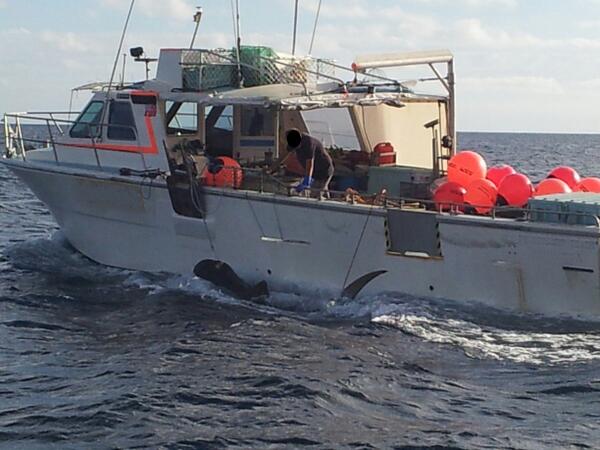The Great White Watch
An independent research guide detailing the migrations and behaviors of the Great White shark. This blog also contains articles on current issues regarding the Great White and other species of shark, as well as information on conservation groups and their efforts to protect sharks and the oceans they live in.
Sunday, January 26, 2014
*Update*
According to 9NewsPerth, protesters have admitted to going out overnight and removing bait from some of the drum lines in WA.

Maryland Shark Finning Ban
Hello all,
The state of Maryland is proposing a new policy that will weaken its ban on shark finning. The state is accepting comments from the public on the policy. David Shiffman, of the RJ Dunlap Marine Lab, has written a post explaining how you can help stop this from going through. Please click the link below and read through his post carefully, following the instructions.
Thank you
http://www.southernfriedscience.com/?p=16498
The state of Maryland is proposing a new policy that will weaken its ban on shark finning. The state is accepting comments from the public on the policy. David Shiffman, of the RJ Dunlap Marine Lab, has written a post explaining how you can help stop this from going through. Please click the link below and read through his post carefully, following the instructions.
Thank you
http://www.southernfriedscience.com/?p=16498
Saturday, January 25, 2014
First Fatality of WA Shark Cull
Word has just been received that the first fatality of State Premier Colin Barnett's shark cull is a 3 meter Tiger shark. The animal was baited on the drum lines, shot several times, and is being dragged out to sea. For those that do not know, tiger sharks are listed as Near Threatened on the IUCN Red List.
Updates will be made when further information is gathered. Until then, send out some positive thoughts that this disgrace of a mitigation policy will not claim any more innocent victims during the Australian summer.

Photo source: 9NewsPerth
Updates will be made when further information is gathered. Until then, send out some positive thoughts that this disgrace of a mitigation policy will not claim any more innocent victims during the Australian summer.

Photo source: 9NewsPerth
Saturday, January 4, 2014
Friday, December 27, 2013
Wednesday, December 25, 2013
Monday, December 23, 2013
Australia’s Shark Mitigation Policy Misses the Mark
This article written by me for plantingpeace.org
In response
to a rise in the number of fatal shark incidences off the coast of Western
Australia in the last two years, the state Premier Colin Barnett has ordered a
cull of all large sharks within close proximity to beaches. These “safe zones”
will contain strategically placed drum lines (baited hooks attached to drums)
that are monitored daily, and will solicit the help of commercial fisherman to
hunt and remove sharks larger than three meters. Species targeted by this act
could include the tiger, bull, and state-protected great white.
The question
by many scientists and activists is whether or not a cull of large sharks would
in fact make the beaches safer; if judging by previous culling attempts, the
answer is no. Between 1959 and 1976, for example, Hawaii killed 4,668 sharks around the islands. According
to the Hawaii Institute of Marine Biology, however, this hunt had no noticeable
effect on the number of bites.
Oftentimes
the argument that favors a lethal solution to shark encounters is one based on
emotion, one that begs the question of whose life is more valuable: the human
or the shark. This is an ineffective way of thinking. Instead, there needs to
be additional funding put towards research to understand where the sharks are
coming from, how often they pass through the areas closer to shore, and what
factors contribute to a person being bitten.
Other
alternatives that could prove more effective are spotting programs, such as
Shark Spotters in South Africa, or a shark relocation program, such as in
Brazil. Shark Spotters was
initiated in South Africa in response to an increased number of great white
sharks being seen closer to shore. It was put into place in an attempt to
balance the needs of both the beachgoers and the sharks. The program uses a
series of flags to warn patrons of an increased possibility of a shark
encounter. A green flag means that spotting conditions are good; a black flag
means spotting conditions are poor. A red flag means there is a high alert for
sharks; a white flag means a shark has been spotted.
After an
increased number of fatal shark bites off of Recife, Brazil, the government
enacted an unconventional approach to shark mitigation. The Shark Monitoring
Program of Recife (SMPR) removes dangerous sharks by capturing,
transporting, and releasing them offshore. This kept the danger to swimmers
minimal while keeping the shark population healthy. While this program has been
in effect, there has been a 97% drop in shark incidences.
There are
several alternatives to culling endangered and vulnerable species to protect
the lives of swimmers and surfers. If you would like to voice your opinion and
let the WA Government know that what they’re planning to do is ineffective,
please sign the petition written by marine zoologist Dr. Barbara Wueringer by clicking the
link below: http://www.change.org/petitions/the-australian-senate-prevent-proactive-killing-of-white-sharks-in-australia-2
Subscribe to:
Comments (Atom)





